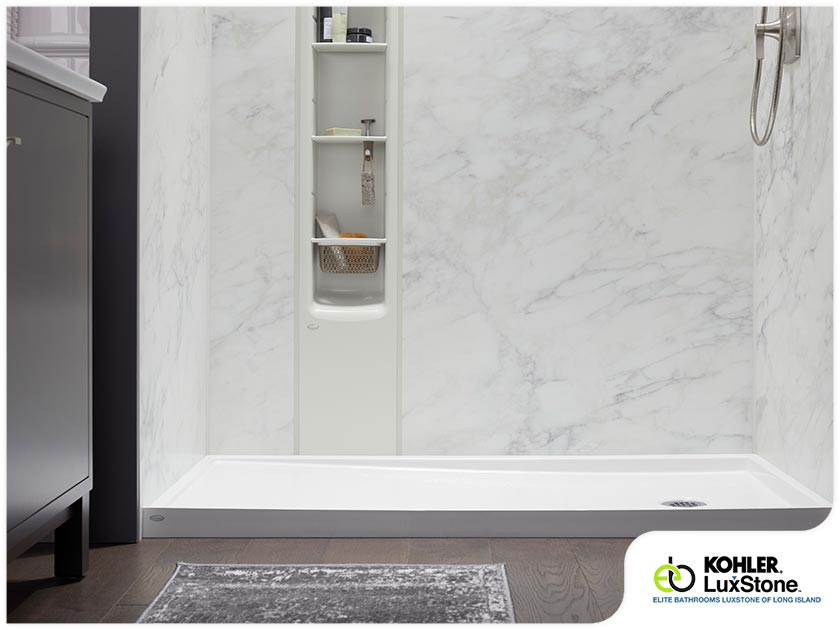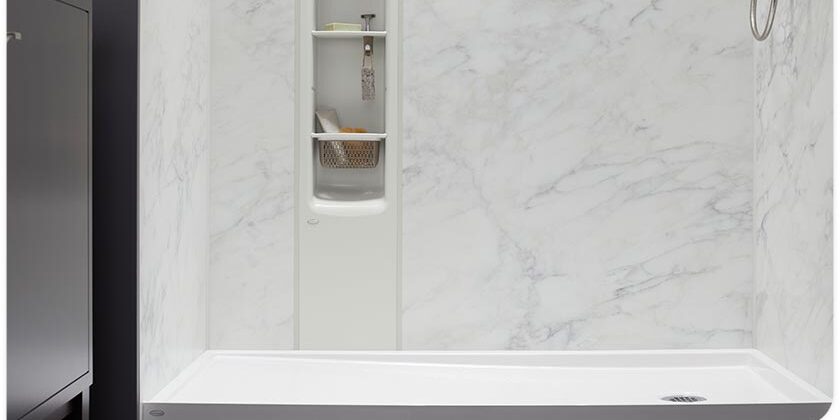When you’re renovating your bathroom, you have a wide range of options to consider when it comes to materials for various surfaces. However, the variety of choices could make it difficult for homeowners to make a decision. As such, today, we will discuss the best and worst materials for bathroom surfaces to help you get started.

Countertops
Countertops are one of the most important surfaces of your bathroom. After all, not only does they give you a place to install your sink and store toiletries, but they also improve your new bathroom’s aesthetic appeal while increasing its value at the same time. Luckily, when you’re remodeling your bathroom and trying to pick a new countertop, bathroom conversion contractors say that the margin of error is relatively small compared to picking floors or walls for the space.
When trying to pick materials for your new bathroom’s countertops, remodeling pros highly recommend embracing materials like laminate, glass, stone or quartz as they can withstand moisture and wear and tear better compared to other countertop materials. Materials to avoid, on the other hand, include tile or copper. This is because the grout tile can get dirty much faster, and colored soap, make up or lotion can easily stain it. Copper, meanwhile, can be maintenance-heavy, making it impractical for homeowners with busy lifestyles.
If you’re dead-set on using tile as your countertop material, however, you should make sure that the grout used will be darker in color in order to effectively disguise any grime that it accumulates.
Flooring
Unlike with countertops, experts say that picking a floor for your bathroom remodeling project can be far more difficult as you’ll want a material that can withstand water or chemical droplets and hot steam without getting slick or deteriorating earlier than it should. Thankfully, there are plenty of materials that can accomplish this. For instance, porcelain tile is said to be one of the best bathroom flooring options you can consider as it is extremely dense and durable as a result of the manufacturing process. Their strength allows porcelain tiles to easily resist water and stains.
Apart from that, they’re also through-colored, meaning that they have the same color all the way through the tile. This can help you disguise chipping should they ever happen. If porcelain is a bit too much for your budget, however, bathroom remodeling contractors say that you can always consider ceramic tile as an alternative.
Other than porcelain or ceramic tile, another good bathroom flooring material that you can consider is sheet vinyl, especially if you’re working on a budget. According to professionals, vinyl is extremely water-resistant and easy to clean, and can even mimic the look of other materials, such as hardwood or natural stone. This allows you to improve your bathroom’s aesthetic appeal without having to pay the high costs of the aforementioned materials. Another advantage of sheet vinyl is that it lacks seams or gaps that can allow water to seep through it, preventing you from having to experience issues, such as hidden mold or mildew growth as well as rot.
Alternatively, if you’re looking for a slip-resistant tile, you’re more than welcome to use flooring materials like rubber or linoleum as they provide a measure of water resistance in the bathroom.
On the other hand, when it comes to materials that you should avoid, you should avoid using wood flooring for your bathroom as it can warp under the wet and steamy conditions that exist within your bathroom. Stone, meanwhile, should also be avoided as water and steam can cause it to become slick, which in turn can create a hazard in your bathroom.
Finally, you should also make it a point to avoid carpet flooring. This is because, while carpet flooring can be slip-resistant, it can also retain moisture, which in turn can lead to mold and mildew growth as well as water damage to the subfloor. This in turn creates an unsanitary bathroom for your home and can force you to spend thousands in repairs to rectify the problem.
Walls
When it comes to your wall options, meanwhile, experts say you’re going to have more freedom and flexibility as you don’t have to worry about whether they will be slippery or not. When picking materials for your new bathroom’s walls, you can choose among ceramic, porcelain or stone tile since they’re good waterproof options that add a lot of personality to your space. However, you should also consider installing decorative tiles in areas that are constantly exposed to large amounts of water, such as the area above the shower or behind the sink. If you’re trying to decorate walls that are further away from water sources, meanwhile, you can always repaint it so long as you avoid flat matte shades.
For bathroom wall materials that you should avoid, bathroom remodeling pros recommend that you steer clear of using wallpaper if you have a shower. This is because the constant steam produced by your shower can cause wallpaper to peel eventually, resulting in an unflattering look for your bathroom. Instead, consider adding a solid vinyl wall covering so you can add texture to your walls while avoiding moisture issues at the same time. However, if your bathroom doesn’t have a shower, then you should be free to use wallpaper so long as your bathroom remodeling expert says it’s okay to do so.
Looking for bathroom renovation companies who can help you remodel your bathroom? Simply turn to Elite Bathrooms LuxStone of Long Island. With years of experience under our belts, we are the leading professionals to approach if you need someone to remodel your bathroom or install KOHLER® products in your home. We are dedicated to giving homeowners such as yourself nothing but the best when it comes to products and services, so you can count on us. Give us a call at (631) 201-4299, or fill out our contact form to get in touch with us and get a quote today!









